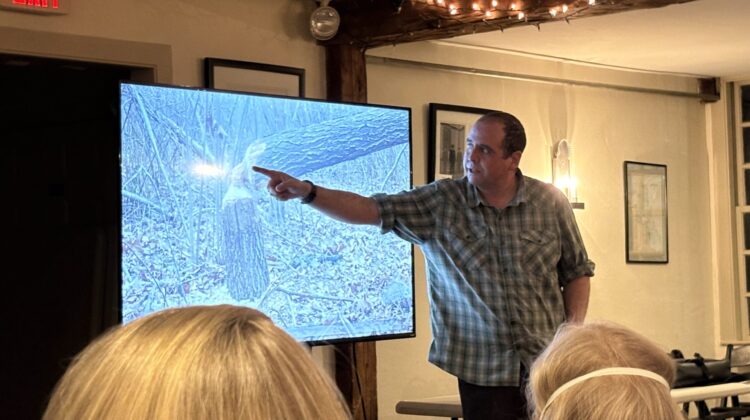The Tree Committee hosted an information session featuring local naturalist Steve Fantone, who has spent the past few years documenting the wildlife and ecosystem of Reedy Meadow, the largest freshwater cattail marsh in Massachusetts.
Through his countless hours of rail trail footage, Fantone’s work highlights the importance of native wildlife, particularly trees, in sustaining habitats such as Reedy Meadow, which spans Lynnfield and Wakefield.
“Native trees are important to the environment because they provide biodiversity and support wildlife,” he explained. “They also help prevent erosion, stabilizing soil, and improve water quality by absorbing rainwater, filtering pollutants, and slowing down water flow.”
Fantone also uses trees as natural tripods, strapping his four trail cameras to them to capture wildlife activity. Any movement triggers the cameras to record for two minutes.
Additionally, he runs a 12-hour daily livestream from a bird feeder along the edge of the Saugus River, which cuts through Reedy Meadow.
The result is 4K footage showcasing local fauna, including deer, turkeys, coyotes, blue jays, and blue herons, all available to the public on his YouTube channel, Steve’s Wildlife. His other channel, Hike Walk Paddle, features drone and 360-camera footage of Boston-area locations such as Pillings Pond, aiming to inspire viewers to explore local ecosystems themselves.
“So, you might say, ‘Where should I visit if I want to see Reedy Meadow for myself?’ A great place to visit Reedy Meadow is the Partridge Island Trail,” Fantone said. “The boardwalk was recently repaired in November by a group of volunteers. It’s important to maintain it because it’s the only public access to the meadow that’s available to everyone.”
As a member of the Lynnfield Open Space and Recreation Working Group, Fantone has organized guided walks through Reedy Meadow.
He also discussed the Lynnfield Rail Trail, which will eventually provide public access to the habitat through an elevated boardwalk.
“I think the rail trail is important because it’ll expose people to the meadow,” he said. “It’s a great opportunity to educate people about what’s out there and about the importance of Reedy Meadow and the importance of taking care of it.”
Besides educating the 40-person audience on Lynnfield’s wildlife, Fantone’s presentation covered the broader benefits of planting trees and how individuals can help protect local ecosystems.
For example, trees regulate temperature by providing shade through transpiration, a process where they absorb water from the ground and then release it into the air, cooling the surrounding environment.
Fantone also shared eco-friendly tips, such as:
- Planting a vegetated buffer with native plants, which helps prevent erosion.
- Installing a rain garden, a depression in the yard that collects rainwater to foster native growth, support pollinators, and reduces polluted runoff.
One of his biggest concerns was the harm of using rat poisons, which can have far-reaching consequences beyond its intended targets.
“Rat poison is bad,” Fantone said. “Animals can eat rodenticide directly or they can eat it from a box. Predators such as owls, bald eagles, and foxes can consume poisoned prey, leading to secondary poisoning in scavengers and other wildlife. These toxins persist in the environment, cause clotting problems, and contribute to mange in animals they do not immediately kill.”
For residents who are excited about learning more about local conservation efforts, the Tree Committee has planned future events, including an Arbor Day celebration featuring a live owl demonstration.

